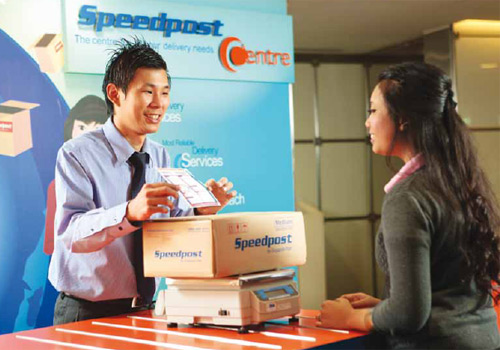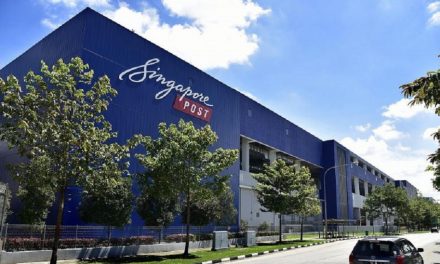
SingPost: A value provider in the heart of Asia
Mail & Express Review Editor John Modd talks with Dr Wolfgang Baier, the Group CEO of SingPost, which is hosting this year’s World Mail & Express Conference and Exhibition in Singapore at the end of this month. In its last financial year SingPost Group’s revenues increased by 7.7% to S$565.8bn, with an underlying net profit of S$149.6bn, a 1.2% improvement on the year before. (A Singapore dollar is worth approximately $0.80 USD).
Mail provides about 59.2% of the Group’s revenue, with 30.5% from logistics and 10.3% from retail.
With a heritage reaching back to 1858, the company listed on the Singapore Stock Exchange in 2003 now has over 4,000 permanent staff and supplementary workers.
Fully privatised with Singapore Telecommunications Limited holding 26% of the shares and a seat on the board, but with other shareholding widely dispersed amongst the public, the Group operates in a postal market fully liberalised in 2007.
Four other postal operators are also licensed to deliver letters in Singapore, but as the designated Public Postal Licensee (PPL), under the regulation of the Info-comm Development Authority (IDA), SingPost has quality of service standards to meet including the delivery of 99% of letters posted within the Central Business District by the next working day.
While meeting these standards in a challenging tropical climate, since his appointment as Group CEO in October last year, Dr Wolfgang Baier has been leading a very aggressive strategy to expand within a region that is itself rapidly developing.
He says: “Although the world economy continues to be lacklustre, it is widely acknowledged that there is still growth potential in Asia as corporate customers look to improve supply chain efficiency and flexibility, and manage costs. Secondly, the growth of online shopping in the region and globally has created e-commerce and e-fulfilment opportunities for us.”
To capture these opportunities, SingPost’s vision is “to be a value provider that fulfils customer needs with lean and innovative solutions,” across the five business units.
Baier says: “With the structural decline in the mail business due to e-substitution and lifestyle changes, SingPost has been proactively working to reduce its reliance on its core business and to build a more balanced revenue and earnings portfolio.”
Nevertheless, mail remains at the heart of SingPost’s business.
“Whilst we have seen a decline in personal correspondence and business transactional mail, this has been offset somewhat by the growth in direct marketing mailings,” says the SingPost CEO.
Investing in mail
Growth has been helped by developing enhanced solutions using the QR code and other innovations, such as the Smartpac for local online retailers and the AM Mail service for urgent delivery before 11am.
Baier says: “Notwithstanding the decline in personal mail, we take our service obligations very seriously and are committed to serve the Singapore market well. We have been investing into people, technology and operations to maintain a quality service. We have also invested into infrastructure such as a new multi-sorter machine and three wheeler bikes to adapt to the changing mail profile.”
The SingPost CEO said as the company’s home base, Singapore is a key market and therefore investment will continue into innovative and value solutions to better serve Singapore customers.
But SingPost has also been investing in wider mail value chain activities, including mailroom and data management, print and production, and fulfilment.
Baier explains: “These activities are really a natural extension of our core competency and have added value to our customers who can focus on their own core business. We are building on our strength as an end to end provider, and on our trusted position.”
The Post also offers hybrid and digital mail services, which Dr Baier considers to be “a natural extension of our physical mail services that provide choice to our customers, particularly the new generation customers and those who are more cost conscious. We see digital services as complementing physical mail services.”
eCommerce
Looking beyond mail, it is clear that for SingPost e-commerce and the management of the logistics chains both in Singapore and across the region are major engines of growth.
E-commerce trade, with increasing flows of parcels and packets intra Asia and with the rest of the world, clearly presents tremendous opportunities for B2C and B2B4C logistics and fulfilment players such as SingPost.
At the front end SingPost is a leading provider of online e-commerce portals, such as Clout Shoppe, an online luxury shop, and the more established vPOST which is a regional and shopping portal.
“We want to continue to pursue growth in this area,” says Baier.
SingPost has also been very active in developing supporting logistic capabilities throughout the AsPac region. As Baier explains: “Singapore is a small and saturated market. We need to expand into the region for growth and also to provide better service to our corporate customers. We have identified full value chain regional logistics as one of our key revenue drivers, boosted by e-commerce and e-fulfilment activities.
“In the last few years, with our presence in ten Asia Pacific countries, we have been accelerating our regional and diversification efforts, including selective investments in existing logistics operators. We work closely with strategic partners to bring value to the identified markets that have the right fit for SingPost’s expansion. For example, we are working on starting a small logistics network with our partner, ITL Logistics, in Vietnam.
“We are leveraging our other regional associates and our regional subsidiary, Quantum Solutions International, to further enhance our value chain for our customers.”
Retail network

Another key strategic issue for posts is the utilisation of the retail network and improving customer access to services.
The SingPost chief executive says his company is currently striving to build added convenience and choices into its retail network, to meet its customers’ lifestyle needs.
SingPost has over 700 customer “touch points” including more than sixty post offices, some 300 Selfservice Automated Machines (SAM), convenience stores, other postal vendors and stamp agents, and the e-commerce portals.
Baier says: “We leverage our distribution network to offer one stop convenient services including bill payment and government services.
“Our offering of financial services since 2005 has been well received by our customers. These are very essential need based services including personal and housing loans, financial planning, and remittances \services, not only for local people but for foreign workers who can send their money back home through a trusted network.”
There is also collaboration with government agencies to offer services such as passport renewal and visa applications. “Generally, the products and services offered through our post offices must be aligned with our infrastructure and meet our customers’ needs too,” he emphasises.
Asia Pacific
Baier, a graduate of the Universities of Vienna, Graz and Exeter who joined global consultancy firm McKinsey in 2001 and spent five years working with SingPost before joining the company as international CEO in 2011, has lived and worked in Asia since 2004, working across the Asia Pacific region.
As host sponsor for this month’s World Mail & Express Asia Pacific Conference, Baier says of the region: “As an emerging market, Asia offers huge growth and business potential, with many multi-nationals establishing their headquarters here.
“During World Mail & Express I look forward to potential business collaborations. There is a need for greater cooperation and collaboration amongst postal operators in these difficult economic times. The key is to find synergies and opportunities where we can help one another to grow either domestically or regionally.”
Baier adds: “The conference is also a good platform for like minded people to get together to share and learn from each other. The industry is undergoing structural changes and all players are similarly impacted. I therefore look forward to the networking, the sharing of challenges and how we can overcome them.”
The World Mail & Express Asia Pacific Conference takes place on 26-28 June 2012 in Singapore. For more details click here »











